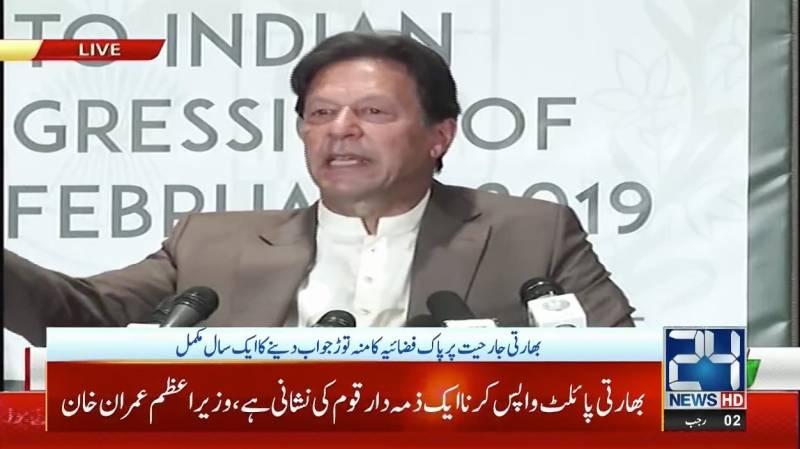PM urges world to act against Indian extremism before its too late
Says Pak response to India's Feb 26 aggression showed nation's maturity

Stay tuned with 24 News HD Android App

Prime Minister Imran Khan has called upon the international community to take notice of Indian extremist leaders like Narendra Modi before it’s too late.
“Mahatma Gandhi was also a victim of extremism that has been plaguing India for decades. India has been trapped in a network of extremists,” PM Imran said in his address at an event held to mark Pakistan’s Responsible and Resolute Response to Indian Aggression on February 26, 2019.
Chairman Joint Chiefs of Staff Committee General Nadeem Raza, Army Chief General Qamar Javed Bajwa, Air Chief Marshal Mujahid Anwar Khan, Federal Ministers Makhdoom Shah Mahmood, Asad Umar, Muhammad Mian Soomro, Azam Khan Swati, Sheikh Rasheed Ahmed, Makhdoom Khusro Bakhtiar, Pir Noorul Haq Qadri, Special Assistant to PM on Information and Broadcasting Dr Firdous Ashiq Awan, foreign ambassadors and other officials also attended the ceremony.
PM Khan paid tribute to Quaid-i-Azam Muhammad Ali Jinnah as he felt for the Muslims of the Subcontinent and created Pakistan, saying: “Jinnah read Hindutva mindset of Indian leadership. Minorities in India are facing injustice, brutalities and human rights violations. Religious places are insecure and youth are being killed brutally on the streets of its capital New Delhi.”
“I was very proud of how the Pakistani people dealt with the crisis,” the prime minister said. The fact that the crisis did not aggravate and the situation didn’t worsen only shows the maturity of the Pakistani nation,” he added.
On Feb 26, 2019, Indian planes violated Pakistani airspace and conducted air strikes inside Pakistani territory. In retaliation the next day, the Pakistan Air Force shot down two Indian fighter jets and captured Indian pilot Wing Commander Abhinandan Varthaman. Prime Minister Imran later decided that Pakistan would release the pilot as a peace gesture.
Addressing the event, the premier said Pakistan was aware through intelligence reports that India planned to show some form of belligerence following the Pulwama attack in Indian-occupied Kashmir. “We were ready,” he said, adding that Pakistan’s entire response to Indian bombing within its territory was that of a mature country.
The prime minister said that the Pakistan armed forces had acted “with restraint” in response to India’s moves while the Pakistani media displayed maturity. In contrast, he said, the Indian media and politicians were beating the drums of war.
“We could have panicked ... and responded to the Indian bombing on the spot. But we waited, realised the next day that there had been no casualties and then responded accordingly,” he recalled.
He also lauded the political parties in the National Assembly for coming onto one page in the wake of the Pakistan-India tensions despite their differences.
Prime Minister Imran said India today has set out on a “very dangerous path” from where it is very difficult to return.
“History shows that only bloodshed follows the kind of racist, totalitarian and fascist RSS (Rashtriya Swayamsevak Sangh) ideology adopted by [India],” he remarked.
He said the Hindutva philosophy prevailing in India is spreading hatred against Muslims and Christians and its next target will be other Indian minorities.
“There can be very serious consequences of marginalising such a large minority. India is now trapped,” he said, calling on the international community to act.
Prime Minister Imran Khan noted that the Indian media had criticised United States President Donald Trump for praising Pakistan during his recent visit to India but said that it reflected “Pakistan’s current standing” in the international community.
Prime Minister Imran said he had tried his best to explain to world leaders the likely consequences of this Hindutva ideology following India’s move to annex occupied Kashmir in August last year.
“Unfortunately no one understood,” he added, noting that the Kashmir move was followed by India’s Citizenship Amendment Act and National Register of Citizens. “Clearly this was something that is not done in the modern world. This violates all humanitarian rights.
“My appeal to the international community is that this is the time to take action,” he said, adding that if the world does not act now, “things will keep getting worse”.
“What we saw in Delhi last night is just the beginning. I don’t see how this is going to stop.”
Earlier, Foreign Minister Makhdoom Shah Mahmood Qureshi addressing the ceremony said “My first message to our eastern neighbour is that do not think of any ill-considered misadventure, because if you do, we will respond and respond immediately, as it is our right to self-defence,” he said while lauding the PAF.
Reiterating Pakistan’s inclination towards regional peace, the foreign minister said that the country wants peaceful relations with its neighbours.
Speaking on the ongoing Afghan peace process, the foreign minister said that Prime Minister Imran Khan is always of the view that there was no military solution to the Afghan conflict.
Qureshi said that Pakistan facilitated the peace process in Afghanistan and is being recognised for it now. “Pakistan is a strong advocate for an inclusive intra-Afghan dialogue as soon as the peace agreement is signed in Doha,” he added.
Qureshi slammed India, saying that it has imposed restrictions in Kashmir, claiming it an internal matter. He said that UN’s Secretary General Antonio Guterres negated this claim here in Islamabad.
Parliamentary Kashmir Committee Chairman Syed Fakhar Imam in his speech, said that Indian steps in Kashmir are today vindicating the two nation theory of Quaid-e-Azam Muhammad Ali Jinnah.
